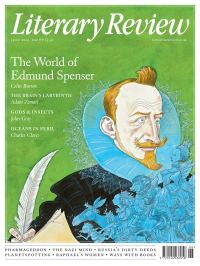Colin Tudge
Selectioneering
Darwin’s Ghosts: In Search of the First Evolutionists
By Rebecca Stott
Bloomsbury 383pp £25
Science is a human pursuit and the history of its ideas, like all human history, is messy; the bigger the idea, the messier its history tends to be. No idea that anyone has had since, say, Muhammad founded Islam, has had more impact than Charles Darwin’s grand notion of evolution by means of natural selection, presented to the world in what he regarded as no more than a sketch in On the Origin of Species in 1859. The idea had its roots in natural history, of course, but also in politics, economics, metaphysics and religion, and has been developed by battalions of thinkers – some generous and humble, some jealous and mean-spirited. It takes great skill and scholarship to tell the story well, and Rebecca Stott does it wonderfully.
Consider how many threads there are in Darwin’s grand idea. First there’s the notion – taken for granted by the mid-nineteenth century, but it took a lot of thrashing out – that there is order in nature at all. It’s obvious to us, perhaps, yet many cultures, including some that

Sign Up to our newsletter
Receive free articles, highlights from the archive, news, details of prizes, and much more.@Lit_Review
Follow Literary Review on Twitter
Twitter Feed
Princess Diana was adored and scorned, idolised, canonised and chastised.
Why, asks @NshShulman, was everyone mad about Diana?
Find out in the May issue of Literary Review, out now.
Literary Review - For People Who Devour Books
In the Current Issue: Nicola Shulman on Princess Diana * Sophie Oliver on Gertrude Stein * Costica Bradatan on P...
literaryreview.co.uk
Under its longest-serving editor, Graydon Carter, Vanity Fair was that rare thing – a New York society magazine that published serious journalism.
@PeterPeteryork looks at what Carter got right.
Peter York - Deluxe Editions
Peter York: Deluxe Editions - When the Going Was Good: An Editor’s Adventures During the Last Golden Age of Magazines by Graydon Carter
literaryreview.co.uk
Henry James returned to America in 1904 with three objectives: to see his brother William, to deliver a series of lectures on Balzac, and to gather material for a pair of books about modern America.
Peter Rose follows James out west.
Peter Rose - The Restless Analyst
Peter Rose: The Restless Analyst - Henry James Comes Home: Rediscovering America in the Gilded Age by Peter Brooks...
literaryreview.co.uk